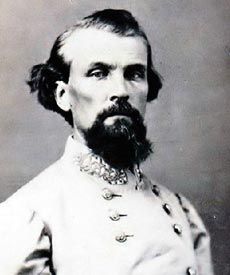Following yesterday’s bloody Battle of Marianna in northwest Florida, in which Union forces emerged victorious, a contingent of nearby Washington County militia assembled and today move toward Marriana in hopes of engaging the Federals. At the same time, the victorious Union forces move out from Marriana this morning. Neither army realizes that they are marching on a course that will result in a surprise engagement with the other.
Around noon the Federals stop for lunch, according to legend, on the grounds of the Old Baptist Academy. Afterwards, they march in the direction of the town of Vernon. Late in the afternoon, the Federals and Rebels stumble upon each other. Following a brief period of fighting in which one Confederate is killed, once again Union forces prevail.
Meanwhile, today’s South Carolina Confederate Baptist newspaper reassures readers, yet again, that slaves remain loyal to their masters. The message is conveyed in rather vivid fashion through a story (now having circulated around the South for well over a month) of how Alabama slaves love Confederate General Nathan Bedford Forrest, a brilliant tactician (and the only man on either side of the war to rise from the rank of private to general) yet a rather violent and brutal general who became infamous earlier this year for murdering black Union soldiers in the Battle of Fort Pillow.
It is known that the negroes of the Methodist congregation at Uniontown, Ala., recently contributed $1000 to the Association for the Relief of Maimed Soldiers, and being informed that this contribution was sufficient to constitute a Life Director, they elected Gen. Forrest for that honor. The Selma Reporter publishes the General’s letter to Dr. Neely, acknowledging the compliment in which he says:
I am not indifferent to the compliment paid me by “the Methodist Congregation of Negroes at Uniontown.” I prize this manifestation on the part of the negro more than I fear the thousand calumnies with which a defeated and vanquished foe are endeavoring to blacken my name. It has been my fortune to have had much dealing with the negro since I arrived at manhood, and I have uniformly treated them with kindness and humanity. Those that have been forcibly taken away from me, I know are sighing for the happy home from which they have been seduced. Those that heeded not the ridiculous promises of the Yankees, and who still remain with me fly from his approaching footsteps with the same instincts of fear and danger that they would fly from a leprosy. I predict, that after peace shall have been restored, most of the negroes that have been decoyed from their homes, will gladly and joyfully return, infinitely preferring slavery among the Southern people to freedom at the North. Instead of being guilty of the atrocities charged upon me, I have uniformly expressed my sympathies for the negro. He has been deluded by false promises, and I had much rather make war upon the white man who has deceived him.
Is this story true? It matters not, for it tells white Southerners what they want to hear at a time when slaves by the tens of thousands have already escaped to freedom behind Union lines (none of which have returned asking to be re-enslaved). The prediction about blacks preferring slavery over freedom represents the continuing delusional thinking of white Southerners even at this late date in the war.
After the war, Forrest is elected as the first Grand Wizard of the Ku Klux Klan, an organization known for harassing, intimidating and–in many instances–killing blacks and their white allies in an attempt to restore strict racial mores in the South.
Nonetheless, Forrest eventually leaves the Klan and allegedly renounces some of his racist past, to the point of advocating for the admission of blacks into law schools.
Sources: Battle of Vernon (link) and (link), Ben Phelan, “Gen. Nathan Bedford Forrest and the KKK,” Public Broadcasting Service, including image (link); “Nathan Bedford Forrest,” Civil War Trust (link); “Gen. Forrest and the Negroes,” Confederate Baptist, September 28, 1864



